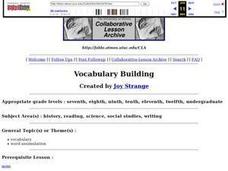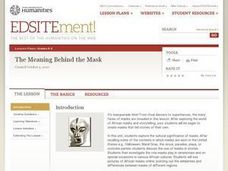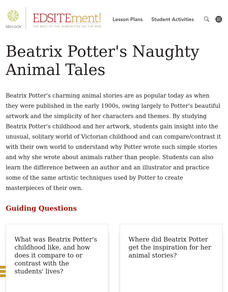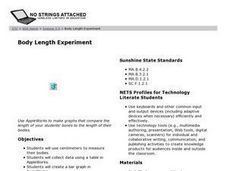Curated OER
Coordinate Graphs, Translations and Reflections
Students perform translations and reflections. In this algebra lesson, students use the TI calculator to graph functions. They move the functions around on the coordinate plane using translation and reflection.
Curated OER
Echinacea No Cure all for Kids
Students look at real data and answer the question of whether or not they would recommend Echinacea to cure a cold. In this investigative lesson students describe whether the data supports the hypothesis that echinacea shortens the...
Curated OER
Peer Editing Form
Save time by downloading a template for peer editing. Included, you will find a one-form-per-page format and a four-forms-per-page format.
San Bernardino Co. Supt. of Schools
Was Julius Caesar a Good Leader for Rome?
Learners consider the various perspectives that different groups in Roman society may have had for Julius Caesar, such as Roman soldiers, senators, the working class, and slaves. The primary activity involves a reading of Caesar's...
9/11 Memorial & Museum
Exploring Afghani Culture through Literature
Hosseini Khaled's The Kite Runner and A Thousand Splendid Suns are the anchor texts in a semester-long course that explores Afghani culture and traditions.
Curated OER
Vocabulary Building - Declaration of Independence
Young scholars read the first part of the Declaration of Independence and mark the words they don't know. First, they try to guess what the words mean by looking at the them in context, and then they look up the words in a dictionary.
Curated OER
The Meaning Behind the Mask
Students explore the world of African masks and storytelling. They create masks that tell stories of their own.
Curated OER
Proving Quadrilateral Properties
Working backwards can sometimes help you see a path to solving a problem. In this chapter, properites of quadrilaterials are proven by looking at flowcharts and working the probem backwards. Worked through examples are given, along with...
Curated OER
Comparison and Contrast: Neat People vs. Sloppy People and Batting Clean-up and Striking Out
After your class reads Neat People vs. Sloppy People and Batting Clean-up and Striking Out, provide them with this resource. Use it as a quiz or a homework assignment to assess your class's understanding of the author's purpose, the...
Curated OER
Protecting the Past: Give a Hoot, Don't Loot!
Students, in small groups, simulate an ancient civilization and the art they created, another group represents vandals, and the final group represents archaeologists who try to figure out what life was like for the "ancient peoples". ...
Curated OER
Beatrix Potter's Naughty Animal Tales
Young scholars gain insight into the unusual, solitary world of Beatrix Potter's Victorian childhood and can compare/contrast it with their own world to explain why Potter wrote such simple stories and why she wrote about animals rather...
Pennsylvania Department of Education
Tell Me Again
Students demonstrate how to retell a story in sequential order. In this reading comprehension lesson, students listen to a suggested read aloud, such as Little Boy Blue. Additionally, students practice retelling the story by using...
Curated OER
U.S. foreign policy in the early Republic
Students research various events during the War of 1812 and then create magazine articles with supporting illustrations, students are in control of their learning.
Curated OER
Lead Critical Reading
Learners read opposing views on the lead contamination issue, identify the facts and opinions in each article, and infer the opinion of the author. They create an essay expressing their opinion on the issue complete with citations.
Curated OER
Body Length Experiment
Students measure the lengths of their bodies and various body parts to determine the relationship (or lack of one) between body part length and the length of the entire body. A spreadsheet program is suggested for data collection.
Curated OER
Levers
Fifth graders participate in a review discussion of the parts of a lever, resistance or load, fulcrum, and effort. Next, they complete activities at six experiment stations while collecting data that they share with the class. While...
PBS
Predicting/Making a Hypothesis
Young scholars analyze information from a variety of sources in order to create a hypothesis about the origin of an interesting family artifact.They create alternative hypotheses based upon available information to demonstrate that some...
Curated OER
Technology: Recipes Around the World
Students research international cuisine and create Web pages based on them. Once they have organized their findings, they demonstrate their research with a multimedia presentation. The project concludes with a party using food ...
Curated OER
Design in Production
Students are introduced to product design. In this social studies and technology lesson plan, students examine the historical role of mass production in the development of American business and industry and then apply their knowledge in...
Curated OER
The Is No Such Thing as a Perfect Pumpkin
Learners explore using descriptive words to describe physical appearance. In this appearance lesson, students look at pumpkins and discuss how there is not a perfect pumpkin. Learners also hypothesize about what the perfect pumpkin's...
Curated OER
Why Would I Owe My Soul to the Company Store?
Sixth graders listen to "Sixteen Tons" by Tennessee Ernie Ford and discuss what it means to owe one's soul to a store. In this mathematics lesson, 6th graders determine what a miner's income was minus his expenses graphing findings in a...
Curated OER
The Diary of Anne Frank
Eighth graders read the Diary of Anne Frank. In this novel reading lesson, 8th graders read and analyze the story. Students do online activities and create a newspaper giving a summary of three major events in the story. Students answer...
Curated OER
Cloudy With A Chance of Meatballs
Third graders read the book, Cloudy with a Chance of Meatballs." Using the internet, 3rd graders research weather conditions, plants, animals and foods from different countries. After sharing information, they discuss similarities and...
Curated OER
A Thousand Paper Cranes
Learners, after finishing Sadako and the Thousand Paper Cranes by Eleanor Coerr, discuss the tragedy of Hiroshima and its impact.

























